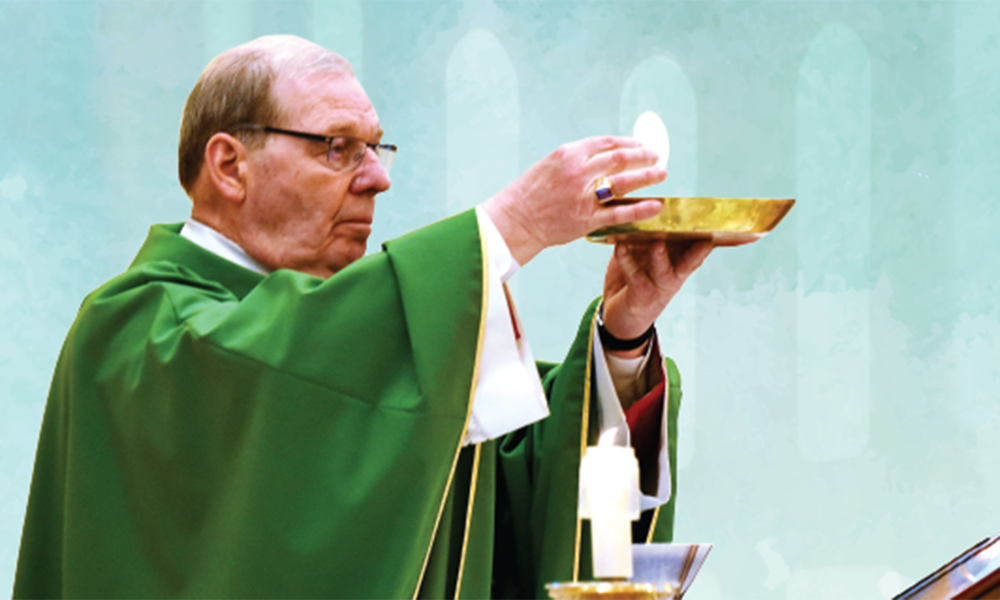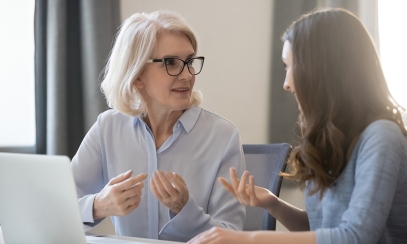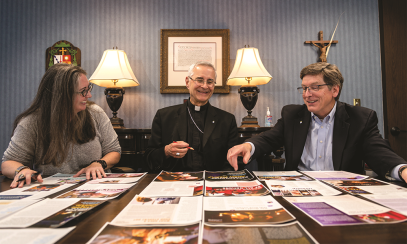
Hope and evangelization in a post-pandemic world
Lois Czerniak, Editor of Harvest Magazine in the Diocese of Portland, took the time to speak with the magazine's publisher, Bishop Robert Deeley, about his vision for the Church in the post-pandemic era.
HOW WILL A POST-PANDEMIC CHURCH BE DIFFERENT?
I think the pandemic has helped us to see what is important, and what is important is the Eucharist and the other sacraments. When the coronavirus first reached Maine, necessitating the cancellation of public Masses, the diocese and all our parishes worked together to do our best to offer people the opportunity to have that experience and that encounter with the Lord Jesus that the Eucharist provides. It has not always been easy, but the response of our clergy, our parish staffs and our parishioners in adapting to this incredible challenge has been extraordinary. Livestreamed Masses, virtual faith formation meetings and online adoration were all made possible through a variety of technology and social media platforms. That helped to keep people connected and to continue the mission. The online Masses have become a vital means of assuring people of the presence of the Lord in their lives. In posture and in prayer, parishioners have joined in actually participating in the Mass, not just watching on television or a computer screen.
One of the beautiful things that happened in responding to the pandemic was the importance the sacrament of reconciliation took on. When it was impossible to come together for Mass, priests began to hear confessions in parking lots and outside of churches in various ways, making that sacramental encounter with the forgiving, merciful Christ available to people. I think the inability to be fed by the Eucharist resulted in a hunger, and the sacrament of reconciliation was one of the ways that was filled. That is certainly something we need to build on as we go forward.
How has the pandemic affected the need for the Church to evangelize?
I think the inability to be fed by the Eucharist resulted in a hunger, and the sacrament of reconciliation was one of the ways that was filled. That is certainly something we need to build on as we go forward.
I think again about Eucharist and what this has done in terms of keeping us apart. We’ll have to think about the importance of the obligation to attend Sunday Mass and underline that it’s not only about worshipping God; it’s also about respect for the community. While there is an obligation to God that comes from the Third Commandment, the obligation to attend Mass is also about forming, building and strength-ening the community through common worship and common prayer. It’s an obligation to one another, to be the community within which we experi-ence the presence of the risen Lord, where we hear him, first of all, merci-fully telling us, “Peace be with you,” and then sending us forth to be his witnesses. I think the need to remind people of that importance is one of the challenges we’re going to have to face. In conversations with bishops, this is one of the issues we’ve talked about.
The positive part of this is that I think the number of people who have been attending Mass via livestream is tremendous. It shows there is a need in people’s lives for spiritual food, and the Eucharist is our spiritual food. I also think, both in our parishes and as a diocese, we’re connected virtually much better than ever before. The crisis has convinced many who doubted that being connected this way is crucial in our world today.
How does your print publication evangelize?
Harvest is our publication, and Harvest always responds to the needs of the community and to the ways in which what is happening in the community can help deepen people’s appreciation of faith. We are in a situation in which we have a pandemic, so how do we help people to be hopeful? How do we help people to look forward? How do we help people to see that there is life and hope beyond the situation we are in? In Harvest, we show them people who are living their faith in a pandemic and how they’re applying their faith to life. Recently, we shared an article on some of our permanent deacons and a deacon’s wife who serves in health care. They talked about how they bring their faith to life in their work during the pandemic. We also featured people committed to providing food for people, something for which there has been an enhanced need. In sharing those articles, we’re showing how people every day live their faith. Hopefully, that will help people to take hope.
How do we help people to see that there is life and hope beyond the situation we are in? In Harvest, we show them people who are living their faith in a pandemic and how they’re applying their faith to life.
How does your publication help you communicate with all the people in your diocese, especially one as large as the Diocese of Portland?
The Diocese of Portland spans 35,500 square miles, and that doesn’t include the islands. There are some 250,000 self-identified Catholics, and what is interesting about our state is that we have many diverse cultures and all kinds of different lifestyles. There are cities, although not very big ones, towns and villages. Then, there are long stretches which are unincorporated, with no organized municipal government. We have coastline, forests and mountains and lakes. We have all kinds of different territory, and the people are as different as the landscape in which they live.
They all know each other, however, because of Harvest. It gives them a sense of our common identity. It connects them to the Church and to the Diocese of Portland, which covers the whole state of Maine. Through the magazine, they come to know the kinds of things that are happening in other parts of the diocese and, from that, learn how they can live the Gospel in their own areas. The magazine lifts up the different ways in which the sacraments are being administered and the ways that people go forth, living out their love of God and neighbor.
I find my column in the magazine to be a good place to address com-mon issues. It gives me an opportunity for teaching and to talk about some of the things that are happening nationally and internationally, reminding us of our participation in a Church larger than just ourselves, through the activities that I’m involved in through the bishops’ conference and also with activities in Rome. I think that helps to expand the readers’ appreciation of the fact that they belong to a Church which is universal. It’s not only our local experience that we are concerned about, but it’s all God’s people in any part of the world.
What is your biggest hope for the future of the Church?
I take hope in the fact that the faith has been preached, confessed and celebrated in Maine for over 400 years. The first Mass was celebrated on an island off Maine’s coast in 1604, and there has been a presence of clergy and the celebration of the Eucharist from that period on.Maine has always struggled with the num-ber of priests that it has. In the 1700s, priests came from France as refugees from the revolution in France. Today, we are blessed with priests from India and Africa, but we are still called to nurture vocations for our-selves, people from here who can show that faith can be lived in this culture, in this age. My hope is that we will be able to expand the number of seminarians that we have and that our religious sisters might have a new life in which they are able to continue some of the great missions they have carried out over the centuries of the diocese.
We are part of a wonderful tradition that sends us forward into the future to do what has been done: to proclaim the Gospel and the meaning that brings to our lives. We believe, and we try to show with all that we do, that the Gospel is the source of joy and meaning for our lives, and what we want to do is to pass that on so that that will always be true for our community.


